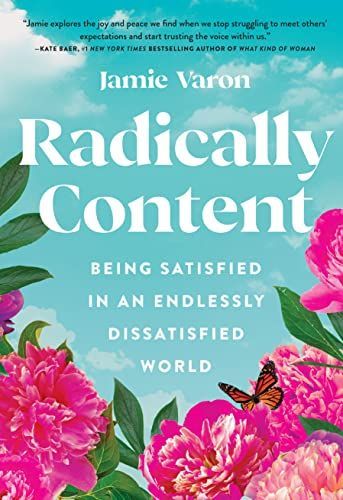
Radically Content Being Satisfied in an Endlessly Dissatisfied World
Blending memoir, sharp social insights, and unique practical tools, author Jamie Varon is your guide to radical contentment—a satisfied life outside the bounds of societal expectations. Too many of us are waiting for our lives to begin, putting our happiness on layaway for some future version where it all lines up, when we’ve accomplished it all, when we have the perfect career, bodies, partners, and when our lives finally feel “good enough.” But what is good enough? Who gets to decide? And when do we ever reach it? Jamie takes a sharp, incisive look at the industries that are constantly telling us to do more, be more, and keep striving, pushing, and hustling—and shows you how to radically opt out of societal conditioning. We’ve learned to be terrified of contentment, thinking it will lead us to complacency. Yet, being content in a world that profits off our dissatisfaction is not complacency. It’s revolutionary. Radically Content makes the case for a new framework of living. Exploring themes like guilt, I’ll be happy when…, anxiety, settling, control, healing, shame, self-trust, and being our own worst enemies—not only will you unlearn the dogma of that discontent, but learn practical tools to create a more satisfied life for yourself, including: Cultivating real self-trust Defining your own version of “success” Living with intention Rewriting your personal narrative Creating consistent and healing rituals Packed with revelatory insights, Radically Content is an exhale. A respite from the chaos of our current world. A calm place to land when you’ve had enough with trying to be enough.
Reviews
Claudine@claudrod
Giulia@karelune
Highlights
Claudine@claudrod
Claudine@claudrod
Claudine@claudrod
Claudine@claudrod
Claudine@claudrod
Claudine@claudrod
Claudine@claudrod
Claudine@claudrod
Claudine@claudrod
Claudine@claudrod
Claudine@claudrod
Claudine@claudrod
Claudine@claudrod
Claudine@claudrod
Claudine@claudrod
Claudine@claudrod
Claudine@claudrod
Claudine@claudrod
Claudine@claudrod
Claudine@claudrod
Claudine@claudrod
Claudine@claudrod
Claudine@claudrod
Claudine@claudrod